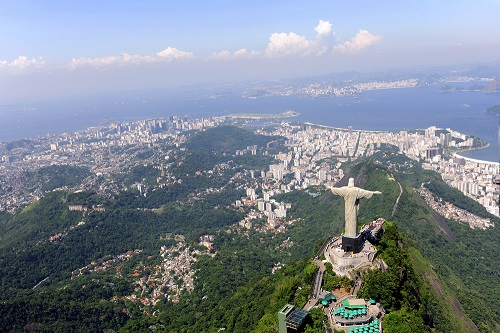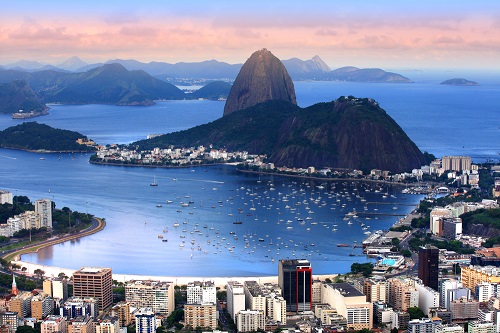The Brazilian labour market is not overly welcoming to foreigners. Companies must demonstrate that two-thirds of their employees are Brazilian, and to get a work visa (needed by any foreigner who wants a job), you’ll need to prove that you can do a job that a Brazilian national cannot. You may find it easier to get a job with an international company with operations in Brazil – there are many big names in this category – but you will still need a work visa to take it up. Most of these companies are based in São Paulo, but others can be found in Rio de Janeiro, Brasília and Macaé. The cities offer the best opportunities for foreigners.
Tax And Pensions
Income tax and social security contributions for resident taxpayers start at a rate of 7.5% and scale up to 27.5% for high earners. You are a resident taxpayer if you hold a permanent visa or a temporary work visa. Deductions are made by your employer at source. Employers also make their own contribution to your social security.
Non-resident taxpayers (e.g. employees of foreign companies drawing their salary from abroad) pay a flat rate of 27.5% on any wages they earn in Brazil.
The Brazilian pension system is in a state of transition. Under the proposed new system, the minimum retirement age will be 62 for women and 65 for men.
Are Any Skills In Particular Demand?
Most full-time jobs available to foreigners are at graduate level. There is a lot of competition from skilled Brazilians, but there is usually high demand for people to fill finance, IT and engineering roles.
Do I Need To Speak The Local Language?
To find a good, graduate-level job in Brazil, you will need to speak Portuguese to a good standard. Even casual jobs are hard to come by, if you can’t speak the language. If your Portuguese is not at least up to conversational standard, then international companies may have suitable roles.

What Are Typical Working Hours And Annual Holiday Entitlement?
Office hours in Brazil are typically 8.00 a.m. to 6.00 p.m. Employees are legally not allowed to work more than eight hours per day or 44 hours each week. All employees are entitled to at least one weekly day of rest, usually taken on a Sunday.
There are 12 national holidays, but some are ‘ponto facultativo’, meaning that the employer gets to decide whether their staff can take the day off. In practice, most do. The two-day Carnival national holiday is ‘ponto facultativo’. Individual states may have their own regional holidays, and government and bank workers are treated to Civil Servants Day in October. Otherwise, holidays are generous but not flexible. One year of service with the same employer will entitle you to 30 days’ annual leave, but you must take this either all at once, or in two parts with one part being at least 20 days.
How Does The Cost Of Living In The Country Compare With Other Countries?
Wages and costs in Brazil are both generally lower than in the UK. Rio de Janeiro and São Paulo are the most expensive cities to live in.
The Brazilian real (R$) is equivalent to about £0.18. The average monthly net salary is 1,819 R$.
Basic utilities for one month – i.e. electricity, heating, aircon, water and waste – for an 85m2 apartment average 308 R$. A monthly internet connection averages 114.19 R$.
Rent on a one-bedroom city centre apartment averages 1,288 R$ per month. A one-bedroom apartment outside the city centre averages 874 R$ per month. A three-bedroom city centre apartment averages 2,566 R$ per month. And outside of the city centre, the average rent per month is 1,801 R$.
These statistics have been taken from Numbeo.
What Are The Major Websites For Job Seekers In This Country?
Please see below for a list of useful job websites:
• Adzuna
• anyworkanywhere.com
• BrasilJob (Portuguese)
• BuscoJobs (Portuguese)
• Careerjet Brazil (Portuguese)
• catho.com.br (Portuguese)
• Cummins Brazil
• Empregos (Portuguese)
• Find A Job in Brazil
• Glassdoor
• Indeed (Portuguese)
• Infojobs (Portuguese)
• Jobatus (Portuguese)
• Jobbydoo (Portuguese)
• jobline.net
• Jobs in Rio
• Jobs in Sao Paulo
• manager.com.br (Portuguese)
• TipTopJob
• Trabajorapido.org (Portuguese)
• transitionsabroad.com (English teaching jobs)
Newspapers (all in Portuguese):
• A Tribuna
• Diário do Grande ABC
• Gazeta Online
Recruitment Agencies
Not every job available in Brazil will be formally advertised, and often finding work will depend on networking and contacts. Therefore recruitment agencies are very commonly used. Some of the better known agencies include:
• BrazilJobNexus
• Fesa
• Grupo Foco
• Michael Page International (Portuguese)
• O&M Cobranca Assessoria e Servicos (Portuguese; specialises in engineering jobs)
• The Taplow Group (international hires)
Direct Applications
For the same reason that recruitment agencies are common, speculative applications are a useful method for finding a job.
Job Fairs
CCUSA hosts occasional job fairs, but these are more tailored towards seasonal staff. You can find more information on the CCUSA website.
CVs/Resumes
Apply for your job with a CV and a covering letter, both typed on A4 in Portuguese. Allowances may be made for imperfect conversational Portuguese, but on paper you must sparkle. It may be worth asking a native speaker to proofread your application for you.
Your cover letter should not exceed one side of A4. Try to find the name of a specific person to address your letter to. Focus on your qualifications, skills and languages.
Your CV should not exceed two pages. There is no need to include elementary education or your marital status. Focus instead on demonstrating why you are the right person for the job. Your CV should contain:
• Personal information (dados pessoais): your full name, contact information and date of birth
• Further education (formação acadêmica)
• Professional work experience (experiência profissional) – this should be listed in reverse chronological order, and should include dates, as well as your job titles and the names of each company
• Advanced qualifications (aperfeiçoamento profissional): the professional skills you have developed that might make you a suitable candidate
• Language and computer skills (línguas e informática)
• Additional information (informações adicionais) – this should include anything else that makes you qualified, for example details of any seminars and workshops you’ve attended, any volunteer work you’ve done and any relevant internships.
Interviews may include a session at a third-party assessment centre, as well as a meeting with your potential employer. Be prepared to demonstrate your suitability for the role, rather than just to talk about your skills and abilities. You could also be asked questions about your personal life. Take it as a good sign if you reach the stage where these kinds of questions are being asked.
Qualifications And Training
Your work experience will act as your qualifications. Certificates and qualifications gained abroad are useful, but they do not need to be transferred to Brazilian equivalents.

